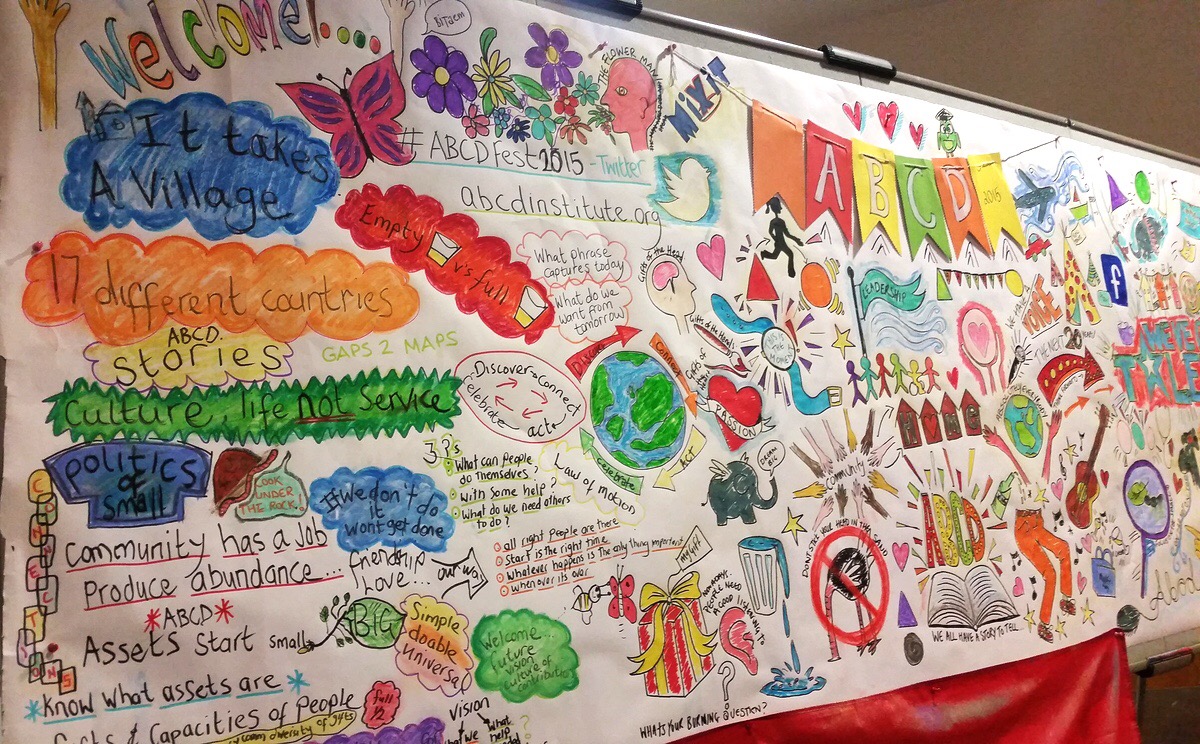Hero or host? The art of using individual assets to build community solutions
Winner of YWCA of Richmond’s first Pat Asch Fellowship for Social Justice, Cheryl Groce-Wright has been traveling the world looking for ideas for how to facilitate conversation and empower communities.

Photo by: crdotx
In April 2015, I received YWCA of Richmond‘s first Pat Asch Fellowship for Social Justice, and with it, an opportunity to study about social justice initiatives around the world. I relished the opportunity to learn abroad in hopes of synthesizing my discoveries–particularly about community organizing–to apply them to Richmond to make our community an even better place to live. My experiences and explorations that I’ve been able to do thanks to the Fellowship have uncovered new and wonderful inspiration for building community.
In my journey, I have become keenly aware that people all around the world are working towards similar goals and outcomes in building and supporting communities that work and grow from the inside out. No matter the country or scale of the community, change and renewal is done well when the people inside communities are the vital voices in defining and determining the course forward for themselves and their neighbors.

ABCD banner created over the course of a four-day conference Cheryl attended in London.
Asset-Based Community Development (ABCD) is one approach that focuses on the assets, strengths, gifts, and talents that are already present in a neighborhood or community to create solutions and positive change. ABCD mobilizes individuals, associations and institutions to work together to build on those assets to create the kind of life they desire.
After 20 years of work internationally, proponents of ABCD and efforts like it have inspired trailblazing strategies that enhance communities and change the lives of their residents. In Atlanta, there are Food and Neighbor Network Associations, food exchanges that have created an innovative method for securing food for the hungry. This ABCD-minded project transforms food pantries into places where people contribute skills and commitment and, in exchange, receive opportunities for food security. Food is obtained by those who need it more readily than at a food give-away, and recipients can improve their community by giving back in the process.
In Walk Out, Walk On, Margaret Wheatley and Deborah Frieze describe their travels and experiences with ABCD in communities in Mexico, Brazil, South Africa, Zimbabwe, India, Greece, and here in the United States. These areas have taken innovative ideas to create solutions and opportunities using skills possessed by their own residents.
Communities developed through their own assets produce new ways of co-existing that empower people to create opportunities to live their best lives. I encountered another example of the efficacy of ABCD when I traveled to England this year in conjunction with the Fellowship. My Life, a marvelous U.K. organization, has created a performance art group called Mixit, to provide differently-abled adults an opportunity to grow, express themselves and build their own self-worth, while also sharing fun and entertainment with others.
Through my Fellowship experience, I discovered the Art of Hosting, a conversational process used with groups to develop strategies, analyze issues, and resolve conflicts. Through this process, groups can create action plans that allow individuals to take charge of the challenges facing them, such as homelessness, education, food security, health care, economic development, and public safety.
Communities developed through their own assets produce new ways of co-existing that empower people to create opportunities to live their best lives.
Working with a range of collaborative methods–such as Circle, World Café, Appreciative Inquiry, Open Space Technology, ProAction Café, and storytelling–facilitators can tailor their approaches to meet specific contexts. These conversations are revolutionizing results of meetings across organizations, governments and communities all over the world. These successes led me to believe that the art of hosting could help Richmond dig into areas of continued conflict, organizing ourselves as a community to face problems of hunger, discrepancies in opportunities, and racism.
Through my reading and exploration this year, the question persists as to who is the best persona to lead: hero or host? Heroes are those folks we look to who fix everything, the perfect leader to lead us out of the mess, the visionary, charismatic, and brilliant leader who everyone will happily follow.
These individuals take on more and more projects and causes, to the detriment of their own sanity. Heroes work harder and harder and put in more hours into projects thinking that this investment of time will solve their problems.
Hosts, on the other hand, invite people to come together to explore solutions framed as a question, and use their positional power to bring people together for a purpose or to achieve an outcome. They create a forum for problems to be solved, for teams to work better, for people to become activists.
As a nonprofit leader who often feels caught in the “hero” space, it feels prudent and wise to take a closer look at that distinction in my own life and work. By becoming more of a host, nonprofit leaders can empower others and facilitate conversations and collaborative resolutions about some of the most difficult questions that I think Richmond is grappling with in our current environment.
Through the adoption of asset-based community development, we can collaborate and combat Richmond’s social injustices. We already have the tools: the talented, passionate people who create Richmond’s vibrant culture. The heroes are all around us–now who wants to host a conversation?
— ∮∮∮ —
YWCA of Richmond will accept applications for the 2016 Pat Asch Fellowship for Social Justice through February 15th, 2016. Women aged 50 years or older working or residing in Richmond may apply for this fellowship, to develop and learn social justice practices to apply toward promoting social justice in our region. Visit www.ywcarichmond.org/fellowship for application materials and information.
-
Recommend this
on Facebook -

Report an error
-

Subscribe to our
Weekly Digest





There are 2 reader comments. Read them.